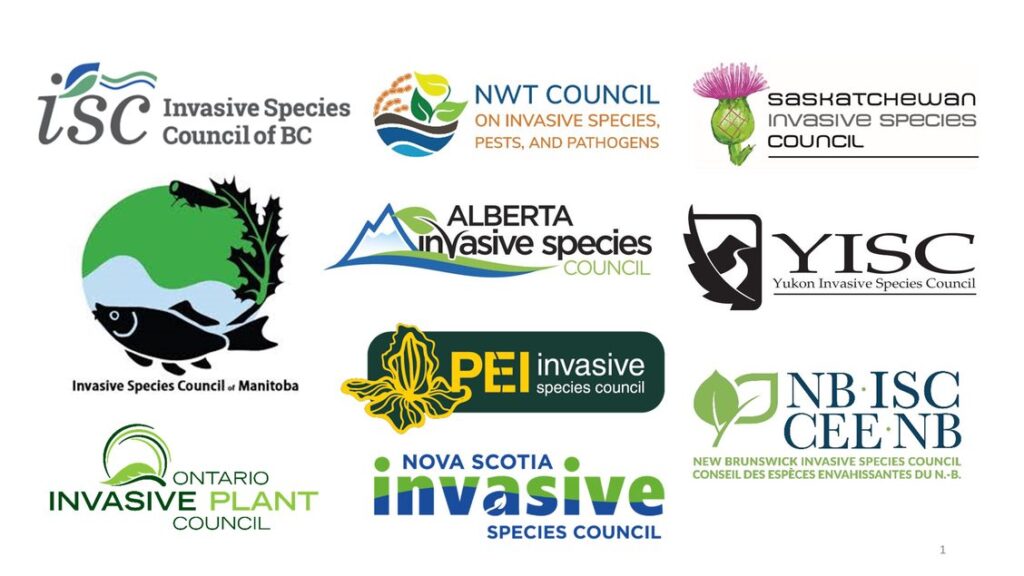Our Chapters have some amazing updates to share with you — keep reading to find out what they’ve been up to.
The Canadian Council on Invasive Species has established a strong network of chapters spanning across Canada, from coast to coast. Each of our 10 chapters is a provincial or territorial invasive species organization with a unique structure and mandate. They work together to create partnerships and address local issues while ensuring consistent messaging and resources to help Canadians take responsible actions.
Our Chapters include:
- Alberta Invasive Species Council
- Invasive Species Council of BC
- Invasive Species Council of Manitoba
- New Brunswick Invasive Species Council
- Northwest Territories Council on Invasive Species, Pests and Pathogens
- Nova Scotia Invasive Species Council
- Ontario Invasive Plant Council
- Prince Edward Island Invasive Species Council
- Saskatchewan Invasive Species Council
- Yukon Invasive Species Council
Here’s an update from some of our chapters
Alberta Invasive Species Council (AISC)
The Alberta Invasive Species Council (AISC) is actively expanding its Aquarium and Pond Retailer Recognition Program. It recently hosted an Informational Webinar on November 16th on the program and how retailers can become certified! In the new year, we will be the pilot of a similar program, Be Plantwise and GrowMeInstead, for retailers in the horticulture and garden industry. The AISC’s 11th Annual Conference and AGM is scheduled for March 20 & 21, 2024, in Olds, AB. Registration opens January 2nd, offering pesticide applicator credits, poster sessions, networking opportunities and more! Poster abstract submissions are welcome until January 12th – stay tuned for all updates on the webpage or our social accounts (@ABinvasives).
The PEIInvasive Species Council
The PEIInvasive Species Council has recently launched a survey to engage the horticulture industry in conversations around invasive species and determine how to work together to limit the spread of invasive plants through this pathway. The survey aims to identify gaps in knowledge and other limitations in adopting a ‘Plantwise’ approach to operations. The PEIISC has also begun work on an early detection and rapid response plan for hemlock woolly adelgid (HWA) on PEI. This project will help PEI prepare for the insect’s arrival, support monitoring efforts, and allow swift action if HWA is detected.
New Brunswick Invasive Species Council (NBISC)
Over the last few months, the New Brunswick Invasive Species Council (NBISC) has been busy wrapping up community outreach and on-the-ground activities, which included participating in over 20 outreach events, completing eDNA sampling for Zebra Mussels, and hosting our first province-wide invasive species BioBlitz. In early November, we held our first in-person NB Invasive Species Summit, which featured a World Café with on-the-ground practitioners, a panel discussion with stakeholders on capacity building, and a field trip to Phragmites and Emerald Ash Borer infestations sites. The event was a huge success and was attended by over 50 government agencies, NGO organizations, and industry representatives.
Nova Scotia Invasive Species Council (NSISC)
This fall, the Nova Scotia Invasive Species Council (NSISC) received their mobile boat decontamination station from OZERO! This unit will clean boats entering Nova Scotia to prevent the introduction of invasive species such as Zebra Mussels into the province. It will also raise awareness of the CLEAN DRAIN DRY program. The NSISC would like to thank Fisheries and Oceans Canada, through the Aquatic Invasive Species Prevention Fund, who sponsored this project. If you want to learn about aquatic invasive species in Nova Scotia, the Nova Scotia Institute of Science is having an in-person and virtual lecture on December 4th. Click here to learn more»
The Northwest Territories (NWT) Council on Invasive Species, Pests, and Pathogens (CISPP)
The Northwest Territories (NWT) Council on Invasive Species, Pests, and Pathogens (CISPP) has moved into a “care and maintenance” mode. At the same time, it transitions away from anon-government, not-for-profit organization to an as-needed public-facing educational collective. Future messaging from the CISPP will collaboratively come from the Government of the NWT and its co-management partners under settled land claim agreements. An extreme 2023 summer wildfire season has delayed many initiatives, including placing a self-directed watercraft decontamination station at the Alberta-NWT border. Plans for this high-pressure, high-temperature washer will resume soon, with hopeful deployment in the spring of 2024.
Yukon Invasive Species Council (YISC)
YISC had a successful summer season focused on community engagement and invasive weed pull events. This fall, we also transitioned our website to a more user-friendly design and ensured that all information was up to date. Additionally, we have increased our activity on social media, creating educational and engaging content to keep people interested and invested in invasive species topics within the territory, including monthly newsletters for our members. Finally, our goal for winter 2023-2024 is to create several courses aimed at the public, including the Spotters Network, Yukon Pollinators, and Aquatic Invasive Species.


